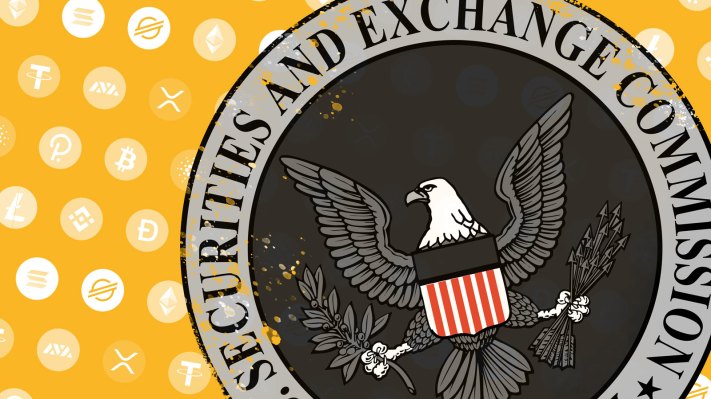Yesterday was a big day for the crypto industry. A former Coinbase product manager was arrested alongside his brother and a friend, and charged with running a cryptocurrency insider trading scheme by the U.S. Department of Justice (DOJ).
At the same time, the U.S. Securities and Exchange Commission (SEC) filed a separate document on the case, designating a number of the assets traded by the group as cryptocurrency securities, a classification that raised eyebrows.
“I think it’s odd the SEC would sue three individuals for violating securities law, arguing that at least nine of the 25 digital assets they bought and sold as part of the alleged scheme qualify as securities, but not pursue the exchange that listed these digital assets,” Hailey Lennon, partner at law firm Anderson Kill, told TechCrunch.
“The truth is, if the Feds wanted this industry regulated — it would be.” Michael Fasanello, chief compliance officer, LVL
The classification of some crypto assets as securities may have major implications for the digital asset industry, which has largely benefited from years of little to no regulatory oversight.
While crypto has been somewhat free from regulation due to its de novo products, it is seeing issues similar to what other financial markets have seen.
Insider trading has been around for long before cryptocurrency, Michael Fasanello, chief compliance officer at LVL, told TechCrunch. “The crime has stayed the same, it’s just the modality that’s different.”
As the industry worries over what lies ahead, lawyers and others in crypto space shared their thoughts with TechCrunch on what the classification of some crypto products as securities could mean for the industry.
A murky path ahead
This is a novel prosecution by the DOJ, Christopher LaVigne, a partner in the litigation team at law firm Withers, said. “But it is a clear message intended to deter this conduct.”
It should not be overlooked that the DOJ’s criminal indictment did not assert that any of the digital assets were securities, Miles Fuller, head of government solutions at TaxBit, told TechCrunch. However, the SEC’s position did, and it is consistent with its recent comments about certain digital assets being considered securities where it feels that the Howey test has been met, he added.
“The really interesting legal question here is whether the assets at issue are ‘securities,'” Jason Allegrante, chief legal and compliance officer at Fireblocks, said. “This case underscores that every participant in the digital asset market needs to be aware of and compliant with existing securities law and regulations.”
To demonstrate its insider trading case, the DOJ doesn’t need to prove the digital assets at issue are securities, LaVigne said. “The SEC, on the other hand, sued these same three individuals for securities fraud. In order to prevail, or have any jurisdiction to prosecute these individuals, the SEC must prove the underlying digital assets are securities.”
Whether the SEC can prove that remains unclear, but its strategically separate prosecution was an “interesting and deliberate move,” LaVigne noted.
If the agency proves that these cryptocurrencies are securities, the industry would have to take a number of steps to mitigate risk after dealing with these tokens outside of the purview of the SEC for years, Fasanello said.
But the possibility of legal problems arising out of this case isn’t very high, Fuller said. “Even if the SEC prevails, meaning that a jury agreed the relevant digital assets are securities, that finding will not be legally binding in any other proceeding,” he said. “Because of this, I would not expect the litigation itself to create any legal liability for other parties, including digital asset developers, but it does provide some insight into where the SEC’s mindset is at.”
A global focus on regulation
The industry is used to being under a regulatory microscope, Lennon said. In the past few months, focus on the crypto ecosystem has ramped up, even beyond the U.S., as government officials across the world push for frameworks and guide rails to be put in place.
“Speculation of a broader crackdown on digital assets as an industry has been coming for years. The truth is, if the Feds wanted this industry regulated — it would be,” Fasanello said.
“The SEC may be hesitant to go after a large exchange with the means to litigate, especially in light of how the Ripple litigation is going,” Lennon said. “I wouldn’t say the industry is freaking out, but it is unfortunate to see the SEC continue to regulate the space in such an indirect manner and through enforcement actions.”
Market participants would have to consider how they deal with these cryptocurrencies if they’re ruled as securities, in terms of avoiding the appearance of illicit trades and tax ramifications, among other considerations, Fasanello said.
Earlier this week, the former U.S. SEC chairman Jay Clayton said regulators have to respond to the “garbage” in the crypto industry first. Whether that “garbage,” among other things, will be regulated anytime soon, remains unclear.
“We should view this as a sign of market maturation and cryptocurrencies hitting a critical mass,” Allegrante said. “Progress is being made to deter bad activity and to enable the healthy development of the emerging categories of the digital asset market.”
Fuller also sees the litigation as a chance for clarity around the SEC’s position on digital assets.
“The SEC has already been fairly outspoken about its desire to crack down on things, so I am not sure if this signals anything new,” Fuller said. “The SEC is definitely chasing bad actors on the fraud and deceptive practices front.”
All in all, the digital assets space can handle a lot of scrutiny and this time is no different, Fasanello said. “The cryptoverse recognizes that this is merely an indictment, and that while historic in terms of being the first insider trading case involving crypto, the case has yet to be litigated. Ask me again when the gavel drops.”
